World+Economic+Forum
-
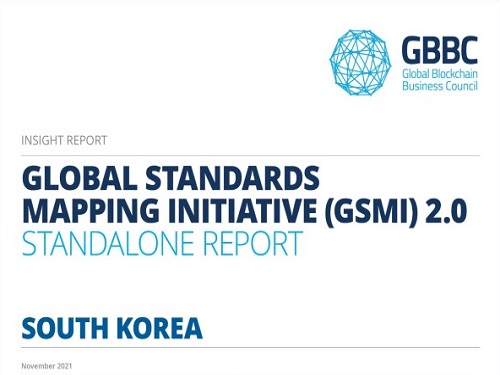 KPC4IR Publishes Global Standards Mapping Initiative 2.0
The report highlights South Korea as an early adopter of blockchain in policy and business
The KAIST Policy Center for the 4IR (KPC4IR), one of the nine working groups of the Global Blockchain Business Council (GBBC), published the Global Standards Mapping Initiative (GSMI) 2.0, highlighting Korea as an early adopter of blockchain. The report also offers an overview of how blockchain was adopted through an analysis of policy and business cases of South Korea.
In partnership with 131 institutions, GSMI 2.0 maps, catalogues, and analyzes data from 187 jurisdictions, 479 industry consortia, 38 technical standards, and 389 university courses and degree programs to provide a holistic view of the industry’s global activity.
Among the nine working groups, KAIST is the sole investigator for researching South Korea’s adoption of blockchain for policy and business. It says that in terms of policy and regulations for blockchain as a virtual asset, South Korea amended the Act on Reporting and Using Specific Financial Transaction Information to comply with the Financial Action Task Force’s recommendations.
The report also reviewed South Korea’s blockchain R&D. Seventeen ministries have funded 417 projects to cultivate blockchain inventions since 2015. Significantly, the Ministry of Science and ICT’s Blockchain Convergence Technology Development Program supported 50 projects between 2018 and 2021. Their R&D focused on virtual assets during the initial stage in 2015 and soon shifted its application to various domains, including identification and logistics.
The report noted that the Korea Customs Service was one of the first agencies in the world to introduce blockchain into customs clearance. Through collaborations with the private sector, the Korean government has also created the world’s first blockchain-based vaccination certification services and extended it to a globally integrated decentralized identity system.
Finally, the report states that these South Korean cases highlight three ambiguities in blockchain policies. First, blockchain involves both financial and industrial features. Thus, it needs a new regulatory framework that embraces the two features together.
Second, integrating services on a blockchain platform will bring forth seamless automation of industries across the manufacturing, financial, and public sectors. South Korea, which already has well-proven manufacturing capabilities, is in need of a comprehensive strategy to encompass multiple services on one platform.
Third, the two cases of the government’s adoption of blockchain suggest that innovations in blockchain can be facilitated through effective cooperation among government ministries and agencies regarding particular businesses in the private sector. Consequently, the government’s policy is not simply to invest in virtual assets but also to develop a virtual-physical world woven by blockchain. The new environment demands that South Korea transform its policy stances on blockchain, from specialization to comprehensiveness and cooperation.
Professor So Young Kim who heads the center said, “This report shows the main lessons from South Korea for other countries adopting blockchain. We will continue to work closely with our partners including the World Economic Forum to investigate many other global issues.”
2021.12.21 View 8568
KPC4IR Publishes Global Standards Mapping Initiative 2.0
The report highlights South Korea as an early adopter of blockchain in policy and business
The KAIST Policy Center for the 4IR (KPC4IR), one of the nine working groups of the Global Blockchain Business Council (GBBC), published the Global Standards Mapping Initiative (GSMI) 2.0, highlighting Korea as an early adopter of blockchain. The report also offers an overview of how blockchain was adopted through an analysis of policy and business cases of South Korea.
In partnership with 131 institutions, GSMI 2.0 maps, catalogues, and analyzes data from 187 jurisdictions, 479 industry consortia, 38 technical standards, and 389 university courses and degree programs to provide a holistic view of the industry’s global activity.
Among the nine working groups, KAIST is the sole investigator for researching South Korea’s adoption of blockchain for policy and business. It says that in terms of policy and regulations for blockchain as a virtual asset, South Korea amended the Act on Reporting and Using Specific Financial Transaction Information to comply with the Financial Action Task Force’s recommendations.
The report also reviewed South Korea’s blockchain R&D. Seventeen ministries have funded 417 projects to cultivate blockchain inventions since 2015. Significantly, the Ministry of Science and ICT’s Blockchain Convergence Technology Development Program supported 50 projects between 2018 and 2021. Their R&D focused on virtual assets during the initial stage in 2015 and soon shifted its application to various domains, including identification and logistics.
The report noted that the Korea Customs Service was one of the first agencies in the world to introduce blockchain into customs clearance. Through collaborations with the private sector, the Korean government has also created the world’s first blockchain-based vaccination certification services and extended it to a globally integrated decentralized identity system.
Finally, the report states that these South Korean cases highlight three ambiguities in blockchain policies. First, blockchain involves both financial and industrial features. Thus, it needs a new regulatory framework that embraces the two features together.
Second, integrating services on a blockchain platform will bring forth seamless automation of industries across the manufacturing, financial, and public sectors. South Korea, which already has well-proven manufacturing capabilities, is in need of a comprehensive strategy to encompass multiple services on one platform.
Third, the two cases of the government’s adoption of blockchain suggest that innovations in blockchain can be facilitated through effective cooperation among government ministries and agencies regarding particular businesses in the private sector. Consequently, the government’s policy is not simply to invest in virtual assets but also to develop a virtual-physical world woven by blockchain. The new environment demands that South Korea transform its policy stances on blockchain, from specialization to comprehensiveness and cooperation.
Professor So Young Kim who heads the center said, “This report shows the main lessons from South Korea for other countries adopting blockchain. We will continue to work closely with our partners including the World Economic Forum to investigate many other global issues.”
2021.12.21 View 8568 -
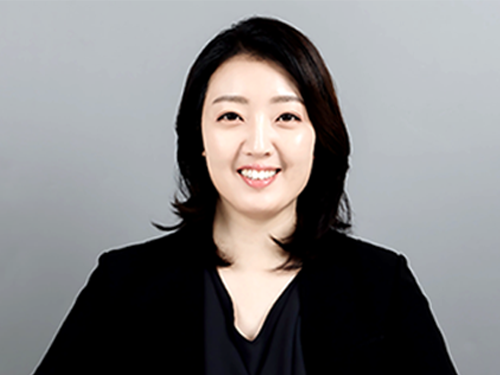 Professor Sue-Hyun Lee Listed Among WEF 2020 Young Scientists
Professor Sue-Hyun Lee from the Department of Bio and Brain Engineering joined the World Economic Forum (WEF)’s Young Scientists Community on May 26. The class of 2020 comprises 25 leading researchers from 14 countries across the world who are at the forefront of scientific problem-solving and social change. Professor Lee was the only Korean on this year’s roster.
The WEF created the Young Scientists Community in 2008 to engage leaders from the public and private sectors with science and the role it plays in society. The WEF selects rising-star academics, 40 and under, from various fields every year, and helps them become stronger ambassadors for science, especially in tackling pressing global challenges including cybersecurity, climate change, poverty, and pandemics.
Professor Lee is researching how memories are encoded, recalled, and updated, and how emotional processes affect human memory, in order to ultimately direct the development of therapeutic methods to treat mental disorders. She has made significant contributions to resolving ongoing debates over the maintenance and changes of memory traces in the brain.
In recognition of her research excellence, leadership, and commitment to serving society, the President and the Dean of the College of Engineering at KAIST nominated Professor Lee to the WEF’s Class of 2020 Young Scientists Selection Committee. The Committee also acknowledged Professor Lee’s achievements and potential for expanding the boundaries of knowledge and practical applications of science, and accepted her into the Community.
During her three-year membership in the Community, Professor Lee will be committed to participating in WEF-initiated activities and events related to promising therapeutic interventions for mental disorders and future directions of artificial intelligence.
Seven of this year’s WEF Young Scientists are from Asia, including Professor Lee, while eight are based in Europe. Six study in the Americas, two work in South Africa, and the remaining two in the Middle East. Fourteen, more than half, of the newly announced 25 Young Scientists are women.
(END)
2020.05.26 View 14498
Professor Sue-Hyun Lee Listed Among WEF 2020 Young Scientists
Professor Sue-Hyun Lee from the Department of Bio and Brain Engineering joined the World Economic Forum (WEF)’s Young Scientists Community on May 26. The class of 2020 comprises 25 leading researchers from 14 countries across the world who are at the forefront of scientific problem-solving and social change. Professor Lee was the only Korean on this year’s roster.
The WEF created the Young Scientists Community in 2008 to engage leaders from the public and private sectors with science and the role it plays in society. The WEF selects rising-star academics, 40 and under, from various fields every year, and helps them become stronger ambassadors for science, especially in tackling pressing global challenges including cybersecurity, climate change, poverty, and pandemics.
Professor Lee is researching how memories are encoded, recalled, and updated, and how emotional processes affect human memory, in order to ultimately direct the development of therapeutic methods to treat mental disorders. She has made significant contributions to resolving ongoing debates over the maintenance and changes of memory traces in the brain.
In recognition of her research excellence, leadership, and commitment to serving society, the President and the Dean of the College of Engineering at KAIST nominated Professor Lee to the WEF’s Class of 2020 Young Scientists Selection Committee. The Committee also acknowledged Professor Lee’s achievements and potential for expanding the boundaries of knowledge and practical applications of science, and accepted her into the Community.
During her three-year membership in the Community, Professor Lee will be committed to participating in WEF-initiated activities and events related to promising therapeutic interventions for mental disorders and future directions of artificial intelligence.
Seven of this year’s WEF Young Scientists are from Asia, including Professor Lee, while eight are based in Europe. Six study in the Americas, two work in South Africa, and the remaining two in the Middle East. Fourteen, more than half, of the newly announced 25 Young Scientists are women.
(END)
2020.05.26 View 14498 -
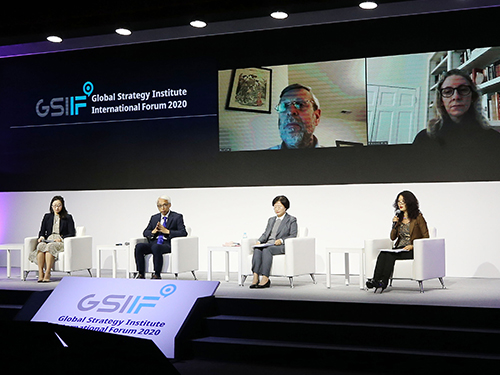 Long Economic Depressions and Disparities Loom in the Wake of the COVID-19
"Global Cooperation for Managing Data Key to Mitigating the Impacts Around the World"
<Full recorded video of the GSI-IF2020>
The COVID-19 pandemic will lead to long economic depressions around the entire world. Experts predicted that the prevalent inequities among the countries, regions, and individuals will aggravate the economic crisis. However, crises always come with new opportunities and international cooperation and solidarity will help creating a new normal in the post-coronavirus era.
In a very basic but urgent step, global cooperation for managing data is the key to respond to COVID-19 since medicine and healthcare are intertwined with data science, said experts during an online international forum hosted by the Global Strategy Institute at KAIST on April 22.
KAIST launched its think-tank, the Global Strategy Institute (GSI), in February. The GSI aims to identify global issues proactively and help make breakthroughs well aligned with solid science-based policies.
The inaugural forum of the GSI focused on how the COVID-19 pandemic would impact socio-economic, scientific, and political landscapes, under the theme “Global Cooperation in the Coronavirus Era.”
In his opening remarks, KAIST President Sung-Chul Shin stressed that future global governance will be dominated by the power of science and technology. “If we can implement efficient policies together with troubleshooting technology for responding to future crises, we will emerge stronger than before,” he said.
President Shin said ‘the Korean model’, which is being recognized as a shining example for dealing with the pandemic, is the result of collaborations combining the creativity of the private sector, the public sector’s strong infrastructure, and the full support of the citizens. He added, “Without the technological prowess coming from the competent R&D power of Korea, we could not achieve these impressive results.”
“Creative collaboration among the private and public sectors, along with research universities from around the world, will help shore up global resilience against the epidemic. We should work together to build a world of growing prosperity,” President Shin said.
Prime Minister Sye-Kyun Chung, who is in charge of the Central Disaster and Safety Countermeasures Headquarters in Korea, stressed global solidarity in his welcoming remarks, saying that “We need to share information and rely on the strength of our connections, rather than retreating into nationalistic isolation.”
Peter Lee, Vice President of the Microsoft Healthcare, pointed out in his welcoming remarks three critical sectors for global cooperation: medicine and healthcare, public health and prevention, and life and the economy. He emphasized the rule of thumb for managing data, saying that data in these fields should be open, standardized, and shared among countries to combat this global pandemic.
During a keynote session, Director General of the International Vaccine Institute (IVI) Jerome Kim described the challenges that go along with developing a vaccine. Dr. Kim said that only 7% of vaccine candidates go through the clinical trial stages, and it will take five to 10 years to completely prove a new vaccine’s safety after completing three stages of clinical tests.
“It’s very challenging to develop the vaccine for COVID-19 within 12 to 15 months,” said Dr. Kim. He added that 78 out of 115 candidates are currently undergoing clinical trials around the world.
There are five groups, including Moderna, Inovio, Jenner Institute, CanSino, and the Beijing Institute of Biological Products, who are doing clinical trials in phases 1 and 2. “Given the fact that COVID-19 is a totally new type of virus, various stakeholders’ participation, such as the National Immunization Technical Advisory Groups, the WHO, and UNICEF, is needed to work together to benefit the entire world,” he pointed out.
Professor Edward Yoonjae Choi from the Graduate School of AI at KAIST shared how AI and data sciences are being utilized to interpret the major trends of the epidemic. His group mainly focuses on deep learning to model electronic health records (EHR) for disease predictions. Professor Choi said AI and machine learning would be crucial solutions and collaborative research projects will surely accelerate how quickly we can overcome the pandemic.
In addition, Dr. Kijung Shin’s group is interpreting the SIR (Susceptible, Infected, and Recovered) model in Korea to predict the number of infections and when people were infected. However, researchers noticed that they could not see the typical modeling in Korea for predicting the number of infections since the model disregarded the new variable of humans’ efforts to stop the spread the virus.
According to research by Professor Steven Whang’s group on social distancing and face mask distribution among vulnerable age groups, people in their 20s, 60s, and 70s followed the social distancing guidelines the most strictly. The research team analyzed the data provided by SK Telecom in the Gangnam district of Seoul. The data provided on people in their 70s, a group that accounted for half of all fatalities, showed that masks were generally well distributed nationwide.
Dr. Alexandros Papaspyrids, Tertiary Education Industry Director of the Asia region of Microsoft, said that despite all the disadvantages and problems related to remote education, we shouldn’t expect to return to the days before the COVID-19 any time soon. “We should accept the new normal and explore new opportunities in the new educational environment,” he said.
Hongtaek Yong, Deputy Minister at the Office of R&D Policy at the Ministry of Science and ICT presented the Korean government’s disease prevention and response policy and how they tried to mitigate the economic and social impact.
He stressed the government’s fast testing, tracing, and openness for successfully flattening the curve, adding that the government used an ICT-based approach in all aspects of their response. From early this year when the first patient was reported, the government aggressively encouraged the biotech industry to develop diagnostic kits and novel therapeutic medications.
As a result, five companies were able to produce genetic diagnostic reagents through the emergency approval. More notably, four of them are conducting massive R&D projects sponsored by the government and this is the result of the government’s continuous investment in R&D. Korea is the leader in R&D investment among the OECD countries.
According to Yong, the government’s big data project that was launched in 2017 continuously traces the trends of epidemics in Korea. The epidemiological studies based on the paths taken by suspected patients using credit card transaction made the difference in predicting the spread of the coronavirus and implementing countermeasures. The data has been provided to the Korea’s Center for Disease Control (CDC).
“In addition to the epidemics, we have so many other pending issues arising from digital and social equities, un-contact services, and job security. We are very open to collaborate and cooperate with other countries to deal with this global crisis,” Yong said.
During the subsequent panel discussions, David Dollar, a senior fellow at the Brookings Institution, said, “The global economy in the coronavirus era will not have a rapid V-shaped recovery, but rather will fall into a long depression for at least two years.” He pointed out that if countries practice protectionism like they did during the Great Depression, the recession will be even worse. Hence, he urged the international community, especially developed nations, to avoid protectionism, consider the economic difficulties of developing countries, and provide them with financial support.
Co-Director of the Center for Universal Education at the Brookings Institution Rebecca Winthrop raised concerns over the recent shift to online teaching and learning, claiming that insufficient infrastructures in low-income families in developing nations are already causing added educational disparities and provoking the inequity issue around the world. “The ways to provide quality education equally through faster and more effective means should be studied,” she said.
Professor Joungho Kim, the director of the KAIST GSI and the forum’s organizer, concluded the event by saying that this forum will be a valuable resource for everyone who is providing assistance to those in need, both during and after the COVID-19 pandemic.
(END)
2020.04.22 View 25295
Long Economic Depressions and Disparities Loom in the Wake of the COVID-19
"Global Cooperation for Managing Data Key to Mitigating the Impacts Around the World"
<Full recorded video of the GSI-IF2020>
The COVID-19 pandemic will lead to long economic depressions around the entire world. Experts predicted that the prevalent inequities among the countries, regions, and individuals will aggravate the economic crisis. However, crises always come with new opportunities and international cooperation and solidarity will help creating a new normal in the post-coronavirus era.
In a very basic but urgent step, global cooperation for managing data is the key to respond to COVID-19 since medicine and healthcare are intertwined with data science, said experts during an online international forum hosted by the Global Strategy Institute at KAIST on April 22.
KAIST launched its think-tank, the Global Strategy Institute (GSI), in February. The GSI aims to identify global issues proactively and help make breakthroughs well aligned with solid science-based policies.
The inaugural forum of the GSI focused on how the COVID-19 pandemic would impact socio-economic, scientific, and political landscapes, under the theme “Global Cooperation in the Coronavirus Era.”
In his opening remarks, KAIST President Sung-Chul Shin stressed that future global governance will be dominated by the power of science and technology. “If we can implement efficient policies together with troubleshooting technology for responding to future crises, we will emerge stronger than before,” he said.
President Shin said ‘the Korean model’, which is being recognized as a shining example for dealing with the pandemic, is the result of collaborations combining the creativity of the private sector, the public sector’s strong infrastructure, and the full support of the citizens. He added, “Without the technological prowess coming from the competent R&D power of Korea, we could not achieve these impressive results.”
“Creative collaboration among the private and public sectors, along with research universities from around the world, will help shore up global resilience against the epidemic. We should work together to build a world of growing prosperity,” President Shin said.
Prime Minister Sye-Kyun Chung, who is in charge of the Central Disaster and Safety Countermeasures Headquarters in Korea, stressed global solidarity in his welcoming remarks, saying that “We need to share information and rely on the strength of our connections, rather than retreating into nationalistic isolation.”
Peter Lee, Vice President of the Microsoft Healthcare, pointed out in his welcoming remarks three critical sectors for global cooperation: medicine and healthcare, public health and prevention, and life and the economy. He emphasized the rule of thumb for managing data, saying that data in these fields should be open, standardized, and shared among countries to combat this global pandemic.
During a keynote session, Director General of the International Vaccine Institute (IVI) Jerome Kim described the challenges that go along with developing a vaccine. Dr. Kim said that only 7% of vaccine candidates go through the clinical trial stages, and it will take five to 10 years to completely prove a new vaccine’s safety after completing three stages of clinical tests.
“It’s very challenging to develop the vaccine for COVID-19 within 12 to 15 months,” said Dr. Kim. He added that 78 out of 115 candidates are currently undergoing clinical trials around the world.
There are five groups, including Moderna, Inovio, Jenner Institute, CanSino, and the Beijing Institute of Biological Products, who are doing clinical trials in phases 1 and 2. “Given the fact that COVID-19 is a totally new type of virus, various stakeholders’ participation, such as the National Immunization Technical Advisory Groups, the WHO, and UNICEF, is needed to work together to benefit the entire world,” he pointed out.
Professor Edward Yoonjae Choi from the Graduate School of AI at KAIST shared how AI and data sciences are being utilized to interpret the major trends of the epidemic. His group mainly focuses on deep learning to model electronic health records (EHR) for disease predictions. Professor Choi said AI and machine learning would be crucial solutions and collaborative research projects will surely accelerate how quickly we can overcome the pandemic.
In addition, Dr. Kijung Shin’s group is interpreting the SIR (Susceptible, Infected, and Recovered) model in Korea to predict the number of infections and when people were infected. However, researchers noticed that they could not see the typical modeling in Korea for predicting the number of infections since the model disregarded the new variable of humans’ efforts to stop the spread the virus.
According to research by Professor Steven Whang’s group on social distancing and face mask distribution among vulnerable age groups, people in their 20s, 60s, and 70s followed the social distancing guidelines the most strictly. The research team analyzed the data provided by SK Telecom in the Gangnam district of Seoul. The data provided on people in their 70s, a group that accounted for half of all fatalities, showed that masks were generally well distributed nationwide.
Dr. Alexandros Papaspyrids, Tertiary Education Industry Director of the Asia region of Microsoft, said that despite all the disadvantages and problems related to remote education, we shouldn’t expect to return to the days before the COVID-19 any time soon. “We should accept the new normal and explore new opportunities in the new educational environment,” he said.
Hongtaek Yong, Deputy Minister at the Office of R&D Policy at the Ministry of Science and ICT presented the Korean government’s disease prevention and response policy and how they tried to mitigate the economic and social impact.
He stressed the government’s fast testing, tracing, and openness for successfully flattening the curve, adding that the government used an ICT-based approach in all aspects of their response. From early this year when the first patient was reported, the government aggressively encouraged the biotech industry to develop diagnostic kits and novel therapeutic medications.
As a result, five companies were able to produce genetic diagnostic reagents through the emergency approval. More notably, four of them are conducting massive R&D projects sponsored by the government and this is the result of the government’s continuous investment in R&D. Korea is the leader in R&D investment among the OECD countries.
According to Yong, the government’s big data project that was launched in 2017 continuously traces the trends of epidemics in Korea. The epidemiological studies based on the paths taken by suspected patients using credit card transaction made the difference in predicting the spread of the coronavirus and implementing countermeasures. The data has been provided to the Korea’s Center for Disease Control (CDC).
“In addition to the epidemics, we have so many other pending issues arising from digital and social equities, un-contact services, and job security. We are very open to collaborate and cooperate with other countries to deal with this global crisis,” Yong said.
During the subsequent panel discussions, David Dollar, a senior fellow at the Brookings Institution, said, “The global economy in the coronavirus era will not have a rapid V-shaped recovery, but rather will fall into a long depression for at least two years.” He pointed out that if countries practice protectionism like they did during the Great Depression, the recession will be even worse. Hence, he urged the international community, especially developed nations, to avoid protectionism, consider the economic difficulties of developing countries, and provide them with financial support.
Co-Director of the Center for Universal Education at the Brookings Institution Rebecca Winthrop raised concerns over the recent shift to online teaching and learning, claiming that insufficient infrastructures in low-income families in developing nations are already causing added educational disparities and provoking the inequity issue around the world. “The ways to provide quality education equally through faster and more effective means should be studied,” she said.
Professor Joungho Kim, the director of the KAIST GSI and the forum’s organizer, concluded the event by saying that this forum will be a valuable resource for everyone who is providing assistance to those in need, both during and after the COVID-19 pandemic.
(END)
2020.04.22 View 25295 -
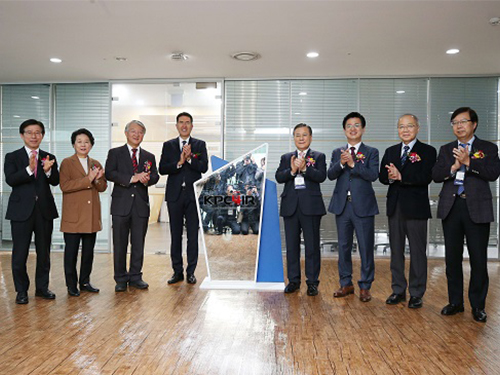 Korea Policy Center for the Fourth Industrial Revolution Opens
The World Economic Forum’s Center for the Fourth Industrial Revolution opened its Korean affiliate center at KAIST on December 10. The Korea Policy Center for the 4th Industrial Revolution (KPC4IR) will develop policy norms and frameworks for accelerating the benefits of emerging technologies.
Many dignitaries including KAIST President Sung-Chul Shin, National Assemblyman Sang-Min Lee, Daejeon City Mayor Her Tae-Jeong, and Managing Director of the WEF Center for the Fourth Industrial Revolution Murat Sonmez attended the opening ceremony.
The center will play a vital role in helping to shape the development of national Fourth Industrial Revolution strategies and public-private initiatives. The Center will actively engage with the government on policy design and piloting activities.
The Center is the result of KAIST’s close partnership with the WEF and its Center for the Fourth Industrial Revolution in San Francisco. KAIST signed an MOU with the WEF in 2017 for this collaboration. Dr. Klaus Schwab expressed his high hopes many times regarding Korea’s potential in responding to the Fourth Industrial Revolution. In addition, he said that KAIST and the City of Daejeon would play a significant role in helping the Fourth Industrial Revolution move forward.
During a meeting with President Moon Jae-In last June, Dr. Schwab expressed his strong desire to collaborate with Korea, and the Korean government designated KAIST as an affiliate center of the WEF.
The KPC4IR had already begun conducting policy research in the areas of block chain and precision medicine even before making a partnership with the WEF. The director of the Center, Distinguished Professor Sang Yup Lee, said, “We have focused on the development of technology but rarely talk about governance. Technology should come with policy. We will conduct policy development on how to ensure inclusive growth capitalizing on emerging technologies. We will also make policy guidelines for technological applications after considering all the ethical perspectives.
President Shin also said in his opening remarks, “Korea has been a fast follower over the past decades in making economic development and innovations. I believe that the Fourth Industrial Revolution gives us the best opportunity to play the role of ‘first mover.’ I look forward to the KPC4IR serving as a ‘Think and Do’ tank, not limiting itself to the role of ‘think tank.’ We will continue to work closely with the WEF in the fields of AI, blockchain, and precision medicine.
2019.12.10 View 10195
Korea Policy Center for the Fourth Industrial Revolution Opens
The World Economic Forum’s Center for the Fourth Industrial Revolution opened its Korean affiliate center at KAIST on December 10. The Korea Policy Center for the 4th Industrial Revolution (KPC4IR) will develop policy norms and frameworks for accelerating the benefits of emerging technologies.
Many dignitaries including KAIST President Sung-Chul Shin, National Assemblyman Sang-Min Lee, Daejeon City Mayor Her Tae-Jeong, and Managing Director of the WEF Center for the Fourth Industrial Revolution Murat Sonmez attended the opening ceremony.
The center will play a vital role in helping to shape the development of national Fourth Industrial Revolution strategies and public-private initiatives. The Center will actively engage with the government on policy design and piloting activities.
The Center is the result of KAIST’s close partnership with the WEF and its Center for the Fourth Industrial Revolution in San Francisco. KAIST signed an MOU with the WEF in 2017 for this collaboration. Dr. Klaus Schwab expressed his high hopes many times regarding Korea’s potential in responding to the Fourth Industrial Revolution. In addition, he said that KAIST and the City of Daejeon would play a significant role in helping the Fourth Industrial Revolution move forward.
During a meeting with President Moon Jae-In last June, Dr. Schwab expressed his strong desire to collaborate with Korea, and the Korean government designated KAIST as an affiliate center of the WEF.
The KPC4IR had already begun conducting policy research in the areas of block chain and precision medicine even before making a partnership with the WEF. The director of the Center, Distinguished Professor Sang Yup Lee, said, “We have focused on the development of technology but rarely talk about governance. Technology should come with policy. We will conduct policy development on how to ensure inclusive growth capitalizing on emerging technologies. We will also make policy guidelines for technological applications after considering all the ethical perspectives.
President Shin also said in his opening remarks, “Korea has been a fast follower over the past decades in making economic development and innovations. I believe that the Fourth Industrial Revolution gives us the best opportunity to play the role of ‘first mover.’ I look forward to the KPC4IR serving as a ‘Think and Do’ tank, not limiting itself to the role of ‘think tank.’ We will continue to work closely with the WEF in the fields of AI, blockchain, and precision medicine.
2019.12.10 View 10195 -
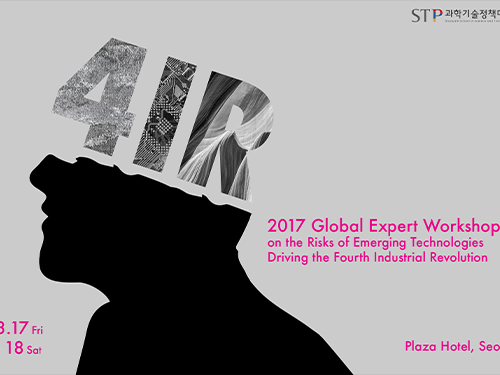 Global Workshop on the Risks of Emerging Technologies
The Center for Science, Policy and Society (CSPS) at the Graduate School of Science and Technology Policy of KAIST will host the 2017 Global Expert Workshop on the Risks of Emerging Technologies Driving the Fourth Industrial Revolution March 17-18 at the Plaza Hotel in Seoul.
At the workshop, experts from public and private sectors at home and abroad will address the socio-economic impacts and implications of the emergence of new technologies that the Fourth Industrial Revolution will bring about. The workshop will be hosted in collaboration with the World Economic Forum’s Global Future Council (GFC) on Technology, Values and Policy. The World Economic Forum’s network of GFCs is the world’s foremost interdisciplinary knowledge network dedicated to promoting innovative thinking about the future.
Four keynote speakers, including Professor Wendell Wallach of the Interdisciplinary Center for Bioethics at Yale University and Dean of the School of Public Policy and Management at Tsinghua University Lan Xue, will deliver speeches. Professor Wallach is the leader of an AI/Robotics Global Governance Project sponsored by the World Economic Forum and will make a speech entitled “Build the Global Infrastructure to Make Sure that AI and Robotics Will Be Beneficial.” Dean Xue, a member of the World Economic Forum’s GFC on Tech, Values, and Policy, is well known for his analysis of the social implications of the risks brought about by emerging technologies. He will speak on “Global Risk Governance of Disruptive 4IR Technologies.”
More than thirty experts will participate in the workshop. Speakers include the KAIST Vice President for Planning and Budget Soohyun Kim, Dean of KAIST Institute San Yup Lee, Professor Jaeseung Jeong of the Department of Bio and Brain Engineering at KAIST, Dr. Sung Chul Kang of the KIST Healthcare Robotics Research Group, and Korea Evaluation Institute of Industrial Technology Program Director Kyong Hoon Kim.
The CSPS of KAIST will continue to make collaborative research efforts with the GFC for developing new insights and perspectives on key global systems as well as study the impact and governance of key emerging technologies.
2017.03.16 View 12137
Global Workshop on the Risks of Emerging Technologies
The Center for Science, Policy and Society (CSPS) at the Graduate School of Science and Technology Policy of KAIST will host the 2017 Global Expert Workshop on the Risks of Emerging Technologies Driving the Fourth Industrial Revolution March 17-18 at the Plaza Hotel in Seoul.
At the workshop, experts from public and private sectors at home and abroad will address the socio-economic impacts and implications of the emergence of new technologies that the Fourth Industrial Revolution will bring about. The workshop will be hosted in collaboration with the World Economic Forum’s Global Future Council (GFC) on Technology, Values and Policy. The World Economic Forum’s network of GFCs is the world’s foremost interdisciplinary knowledge network dedicated to promoting innovative thinking about the future.
Four keynote speakers, including Professor Wendell Wallach of the Interdisciplinary Center for Bioethics at Yale University and Dean of the School of Public Policy and Management at Tsinghua University Lan Xue, will deliver speeches. Professor Wallach is the leader of an AI/Robotics Global Governance Project sponsored by the World Economic Forum and will make a speech entitled “Build the Global Infrastructure to Make Sure that AI and Robotics Will Be Beneficial.” Dean Xue, a member of the World Economic Forum’s GFC on Tech, Values, and Policy, is well known for his analysis of the social implications of the risks brought about by emerging technologies. He will speak on “Global Risk Governance of Disruptive 4IR Technologies.”
More than thirty experts will participate in the workshop. Speakers include the KAIST Vice President for Planning and Budget Soohyun Kim, Dean of KAIST Institute San Yup Lee, Professor Jaeseung Jeong of the Department of Bio and Brain Engineering at KAIST, Dr. Sung Chul Kang of the KIST Healthcare Robotics Research Group, and Korea Evaluation Institute of Industrial Technology Program Director Kyong Hoon Kim.
The CSPS of KAIST will continue to make collaborative research efforts with the GFC for developing new insights and perspectives on key global systems as well as study the impact and governance of key emerging technologies.
2017.03.16 View 12137 -
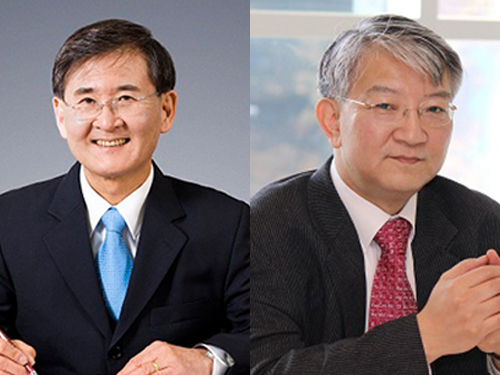 KAIST to Participate in the 2017 Davos Forum
(President Sung-Mo Kang and Distinguished Professor Sang Yup Lee)
KAIST representatives will join high profile, multi-stakeholder dialogues with global leaders across the world to discuss higher education, science, and technological innovation.
KAIST President Sung-Mo Kang and Distinguished Professor Sang Yup Lee of the Chemical and Biomolecular Engineering Department will participate in the World Economic Forum’s (WEF) Annual Meeting on January 17-20, 2017, in Davos-Klosters, Switzerland.
To be held under the theme “Responsive and Responsible Leadership,” the Annual Meeting will offer global leaders from government, business, academia, and civil society a highly interactive platform to address some of the most pressing issues facing the world today, from climate change, economic inequality, to the Fourth Industrial Revolution and its impact on future employment.
On January 18, President Kang will participate in the Global University Leaders Forum, a community of top 26 universities invited from around the world, and will discuss the relevance of higher education in the context of the Fourth Industrial Revolution. He will also share KAIST’s experiences in developing innovative initiatives to bring future-oriented and creative values into its educational and research programs.
On January 19, at the Global Future Council on Production, President Kang will speak about new technologies taking place in traditional production and distribution systems as introduced by the emergence of rapidly evolving technological advancements, and present KAIST’s endeavors to transform those changes into opportunities.
With an eminent group of scientists, including the Director of the US National Science Foundation France A. Córdova and the Editor-in-Chief Philip Campbell of Nature at the Global Science Outlook session, on January 20, President Kang will discuss key challenges for the global science agenda in the year ahead and examine the role of science in formulating public discussions and polices that will have great impact on society and the lives of people.
Currently, Professor Lee is the founding Co-Chair of the WEF’s Global Future Council, an interdisciplinary knowledge network dedicated to promoting innovative thinking on the future. On January 20, he will share his insights at an independent session entitled “World Changing Technology: Biotech and Neurotech,” briefing the audience on the current state of research, development, and commercialization in these fields, as well as explaining how they will contribute to coping with the Fourth Industrial Revolution.
Professor Lee said, “In recent years, we have seen the world become ever more complex, interconnected, and realigned as it is deeply affected by this unprecedented technological innovations, collectively driving the Fourth Industrial Revolution. One pillar of such innovation will take place in biotechnology and neuroscience, which will help us design solutions to many of global problems such as environment, pandemic diseases, aging, healthcare, and previously intractable illnesses.”
President Kang added, “This year’s Davos meeting will focus on the need to foster leadership at the national, regional, and global level to respond collectively with credible actions to issues of major concern for the sustainable and equitable growth, social inclusion, and human development. KAIST has always been a crucial player in these collaborative efforts, and I am happy to share our insights at the upcoming event.”
2017.01.17 View 10160
KAIST to Participate in the 2017 Davos Forum
(President Sung-Mo Kang and Distinguished Professor Sang Yup Lee)
KAIST representatives will join high profile, multi-stakeholder dialogues with global leaders across the world to discuss higher education, science, and technological innovation.
KAIST President Sung-Mo Kang and Distinguished Professor Sang Yup Lee of the Chemical and Biomolecular Engineering Department will participate in the World Economic Forum’s (WEF) Annual Meeting on January 17-20, 2017, in Davos-Klosters, Switzerland.
To be held under the theme “Responsive and Responsible Leadership,” the Annual Meeting will offer global leaders from government, business, academia, and civil society a highly interactive platform to address some of the most pressing issues facing the world today, from climate change, economic inequality, to the Fourth Industrial Revolution and its impact on future employment.
On January 18, President Kang will participate in the Global University Leaders Forum, a community of top 26 universities invited from around the world, and will discuss the relevance of higher education in the context of the Fourth Industrial Revolution. He will also share KAIST’s experiences in developing innovative initiatives to bring future-oriented and creative values into its educational and research programs.
On January 19, at the Global Future Council on Production, President Kang will speak about new technologies taking place in traditional production and distribution systems as introduced by the emergence of rapidly evolving technological advancements, and present KAIST’s endeavors to transform those changes into opportunities.
With an eminent group of scientists, including the Director of the US National Science Foundation France A. Córdova and the Editor-in-Chief Philip Campbell of Nature at the Global Science Outlook session, on January 20, President Kang will discuss key challenges for the global science agenda in the year ahead and examine the role of science in formulating public discussions and polices that will have great impact on society and the lives of people.
Currently, Professor Lee is the founding Co-Chair of the WEF’s Global Future Council, an interdisciplinary knowledge network dedicated to promoting innovative thinking on the future. On January 20, he will share his insights at an independent session entitled “World Changing Technology: Biotech and Neurotech,” briefing the audience on the current state of research, development, and commercialization in these fields, as well as explaining how they will contribute to coping with the Fourth Industrial Revolution.
Professor Lee said, “In recent years, we have seen the world become ever more complex, interconnected, and realigned as it is deeply affected by this unprecedented technological innovations, collectively driving the Fourth Industrial Revolution. One pillar of such innovation will take place in biotechnology and neuroscience, which will help us design solutions to many of global problems such as environment, pandemic diseases, aging, healthcare, and previously intractable illnesses.”
President Kang added, “This year’s Davos meeting will focus on the need to foster leadership at the national, regional, and global level to respond collectively with credible actions to issues of major concern for the sustainable and equitable growth, social inclusion, and human development. KAIST has always been a crucial player in these collaborative efforts, and I am happy to share our insights at the upcoming event.”
2017.01.17 View 10160 -
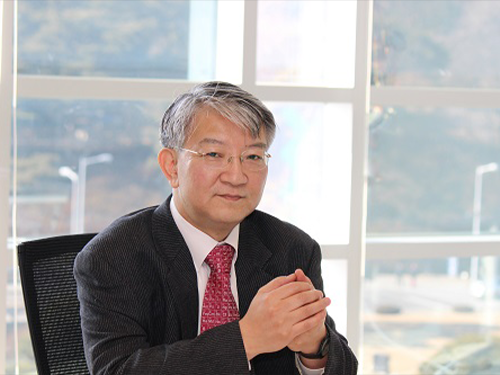 Professor Lee Co-chairs the Global Future Councils on Biotechnology of the WEF
The World Economic Forum (WEF) established a new global network of the world’s leading experts, “The Annual Meeting of the Global Future Councils,” to explore innovative solutions for the most pressing global challenges. The Councils’ first meeting took place on November 13-14, 2016, in Dubai, the United Arab Emirates (UAE). Some 25 nations joined as member states. The Councils have 35 committees.
Over 700 global leaders in business, government, civil society and academia gathered at the inaugural meeting to “develop ideas and strategies to prepare the world for the Fourth Industrial Revolution, with topics including smart cities, robotics, and the future of mobility,” according to a statement issued by the WEF.
Distinguished Professor Sang Yup Lee of Chemical and Biomolecular Engineering at KAIST was appointed to co-chair one of the Councils' committees, The Annual Meeting of the Global Future Councils on Biotechnology, for two years. The other chairperson is Dr. Feng Zhang, a professor of Biomedical Engineering at the Massachusetts Institute of Technology (MIT), who played a critical role in the development of optogenetics and CRISPR technologies.
The Biotechnology Committee consists of 24 globally recognized professionals in life sciences, law, ethics and policy including Thomas Connelly, the executive director of the American Chemical Society, Tina Fano, the executive vice president of Novozymes, and Mostafa Ronaghi, the chief technology officer of Illumina.
Professor Lee also serves as a committee member of The Annual Meeting of the Global Future Councils on the Fourth Industrial Revolution.
“Life sciences and engineering will receive more attention as a key element of the Fourth Industrial Revolution that the global society as a whole has been experiencing now. Together with thought leaders gathered worldwide, I will join the international community’s concerted efforts to address issues of importance that impact greatly on the future of humanity,” Professor Lee said.
In addition, Professor Lee received the James E. Bailey Award 2016 from The Society for Biological Engineering on November 15, 2016. He is the first Asian researcher to be recognized for his contributions to the field of biotechnology.
2016.11.15 View 11193
Professor Lee Co-chairs the Global Future Councils on Biotechnology of the WEF
The World Economic Forum (WEF) established a new global network of the world’s leading experts, “The Annual Meeting of the Global Future Councils,” to explore innovative solutions for the most pressing global challenges. The Councils’ first meeting took place on November 13-14, 2016, in Dubai, the United Arab Emirates (UAE). Some 25 nations joined as member states. The Councils have 35 committees.
Over 700 global leaders in business, government, civil society and academia gathered at the inaugural meeting to “develop ideas and strategies to prepare the world for the Fourth Industrial Revolution, with topics including smart cities, robotics, and the future of mobility,” according to a statement issued by the WEF.
Distinguished Professor Sang Yup Lee of Chemical and Biomolecular Engineering at KAIST was appointed to co-chair one of the Councils' committees, The Annual Meeting of the Global Future Councils on Biotechnology, for two years. The other chairperson is Dr. Feng Zhang, a professor of Biomedical Engineering at the Massachusetts Institute of Technology (MIT), who played a critical role in the development of optogenetics and CRISPR technologies.
The Biotechnology Committee consists of 24 globally recognized professionals in life sciences, law, ethics and policy including Thomas Connelly, the executive director of the American Chemical Society, Tina Fano, the executive vice president of Novozymes, and Mostafa Ronaghi, the chief technology officer of Illumina.
Professor Lee also serves as a committee member of The Annual Meeting of the Global Future Councils on the Fourth Industrial Revolution.
“Life sciences and engineering will receive more attention as a key element of the Fourth Industrial Revolution that the global society as a whole has been experiencing now. Together with thought leaders gathered worldwide, I will join the international community’s concerted efforts to address issues of importance that impact greatly on the future of humanity,” Professor Lee said.
In addition, Professor Lee received the James E. Bailey Award 2016 from The Society for Biological Engineering on November 15, 2016. He is the first Asian researcher to be recognized for his contributions to the field of biotechnology.
2016.11.15 View 11193 -
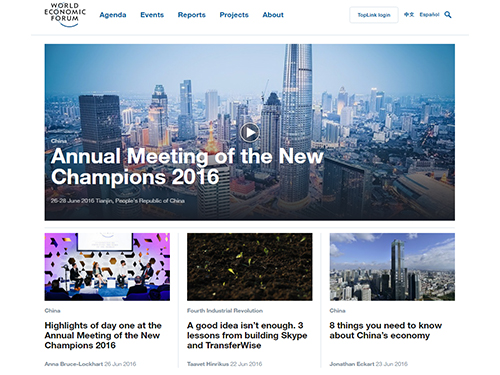 KAIST to Participate in Summer Davos Forum 2016 in China
A group of KAIST researchers will share their insights on the future and challenges of the current technological innovations impacting all aspects of society, while showcasing their research excellence in artificial intelligence and robotics.
Scientific and technological breakthroughs are more important than ever as key agents to drive social, economic, and political changes and advancements in today’s world. The World Economic Forum (WEF), an international organization that provides one of the broadest engagement platforms to address issues of major concern to the global community, will discuss the effects of these breakthroughs at its 10th Annual Meeting of the New Champions, a.k.a., the Summer Davos Forum, in Tianjin, China, June 26-28, 2016.
Three professors from the Korea Advanced Institute of Science and Technology (KAIST) will join the Annual Meeting and offer their expertise in the fields of biotechnology, artificial intelligence, and robotics to explore the conference theme, “The Fourth Industrial Revolution and Its Transformational Impact.” The Fourth Industrial Revolution, a term coined by WEF founder, Klaus Schwab, is characterized by a range of new technologies that fuse the physical, digital, and biological worlds, such as the Internet of Things, cloud computing, and automation.
Distinguished Professor Sang Yup Lee of the Chemical and Biomolecular Engineering Department will speak at the Experts Reception to be held on June 25, 2016 on the topic of “The Summer Davos Forum and Science and Technology in Asia.” On June 27, 2016, he will participate in two separate discussion sessions.
In the first session entitled “What If Drugs Are Printed from the Internet?,” Professor Lee will discuss the impacts of advancements in biotechnology and 3D printing technology on the future of medicine with Nita A. Farahany, a Duke University professor. Clare Matterson, the Director of Strategy at Wellcome Trust in the United Kingdom, will serve as the moderator. The discussants will note recent developments made in the way patients receive their medicine, for example, downloading drugs directly from the internet and the production of yeast strains to make opioids for pain treatment through systems metabolic engineering. They will also suggest how these emerging technologies will transform the landscape of the pharmaceutical industry in the years to come.
In the second session, “Lessons for Life,” Professor Lee will talk about how to nurture life-long learning and creativity to support personal and professional growth necessary in an era of the new industrial revolution.
During the Annual Meeting, Professors Jong-Hwan Kim of the Electrical Engineering School and David Hyunchul Shim of the Aerospace Department will host, together with researchers from Carnegie Mellon University and AnthroTronix, an engineering research and development company, a technological exhibition on robotics. Professor Kim, the founder of the internally renowned Robot World Cup, will showcase his humanoid soccer-playing micro-robots and display their various cutting-edge technologies such as imaging processing, artificial intelligence, walking, and balancing. Professor Shim will present a human-like robotic piloting system, PIBOT, which autonomously operates a simulated flight program by employing control sticks and guiding an airplane from takeoff to landing.
In addition, the two professors will join Professor Lee, who is also a moderator, to host a KAIST-led session on June 26, 2016, entitled “Science in Depth: From Deep Learning to Autonomous Machines.” Professors Kim and Shim will explore new opportunities and challenges in their fields from machine learning to autonomous robotics, including unmanned vehicles and drones.
Since 2011, KAIST has participated in the World Economic Forum’s two flagship conferences, the January and June Davos Forums, to introduce outstanding talents, share their latest research achievements, and interact with global leaders.
KAIST President Steve Kang said, “It is important for KAIST to be involved in global forums that identify issues critical to humanity and seek answers to solve them, and where our skills and knowledge in science and technology can play a meaningful role. The Annual Meeting in China will become another venue to accomplish this.”
2016.06.27 View 14337
KAIST to Participate in Summer Davos Forum 2016 in China
A group of KAIST researchers will share their insights on the future and challenges of the current technological innovations impacting all aspects of society, while showcasing their research excellence in artificial intelligence and robotics.
Scientific and technological breakthroughs are more important than ever as key agents to drive social, economic, and political changes and advancements in today’s world. The World Economic Forum (WEF), an international organization that provides one of the broadest engagement platforms to address issues of major concern to the global community, will discuss the effects of these breakthroughs at its 10th Annual Meeting of the New Champions, a.k.a., the Summer Davos Forum, in Tianjin, China, June 26-28, 2016.
Three professors from the Korea Advanced Institute of Science and Technology (KAIST) will join the Annual Meeting and offer their expertise in the fields of biotechnology, artificial intelligence, and robotics to explore the conference theme, “The Fourth Industrial Revolution and Its Transformational Impact.” The Fourth Industrial Revolution, a term coined by WEF founder, Klaus Schwab, is characterized by a range of new technologies that fuse the physical, digital, and biological worlds, such as the Internet of Things, cloud computing, and automation.
Distinguished Professor Sang Yup Lee of the Chemical and Biomolecular Engineering Department will speak at the Experts Reception to be held on June 25, 2016 on the topic of “The Summer Davos Forum and Science and Technology in Asia.” On June 27, 2016, he will participate in two separate discussion sessions.
In the first session entitled “What If Drugs Are Printed from the Internet?,” Professor Lee will discuss the impacts of advancements in biotechnology and 3D printing technology on the future of medicine with Nita A. Farahany, a Duke University professor. Clare Matterson, the Director of Strategy at Wellcome Trust in the United Kingdom, will serve as the moderator. The discussants will note recent developments made in the way patients receive their medicine, for example, downloading drugs directly from the internet and the production of yeast strains to make opioids for pain treatment through systems metabolic engineering. They will also suggest how these emerging technologies will transform the landscape of the pharmaceutical industry in the years to come.
In the second session, “Lessons for Life,” Professor Lee will talk about how to nurture life-long learning and creativity to support personal and professional growth necessary in an era of the new industrial revolution.
During the Annual Meeting, Professors Jong-Hwan Kim of the Electrical Engineering School and David Hyunchul Shim of the Aerospace Department will host, together with researchers from Carnegie Mellon University and AnthroTronix, an engineering research and development company, a technological exhibition on robotics. Professor Kim, the founder of the internally renowned Robot World Cup, will showcase his humanoid soccer-playing micro-robots and display their various cutting-edge technologies such as imaging processing, artificial intelligence, walking, and balancing. Professor Shim will present a human-like robotic piloting system, PIBOT, which autonomously operates a simulated flight program by employing control sticks and guiding an airplane from takeoff to landing.
In addition, the two professors will join Professor Lee, who is also a moderator, to host a KAIST-led session on June 26, 2016, entitled “Science in Depth: From Deep Learning to Autonomous Machines.” Professors Kim and Shim will explore new opportunities and challenges in their fields from machine learning to autonomous robotics, including unmanned vehicles and drones.
Since 2011, KAIST has participated in the World Economic Forum’s two flagship conferences, the January and June Davos Forums, to introduce outstanding talents, share their latest research achievements, and interact with global leaders.
KAIST President Steve Kang said, “It is important for KAIST to be involved in global forums that identify issues critical to humanity and seek answers to solve them, and where our skills and knowledge in science and technology can play a meaningful role. The Annual Meeting in China will become another venue to accomplish this.”
2016.06.27 View 14337 -
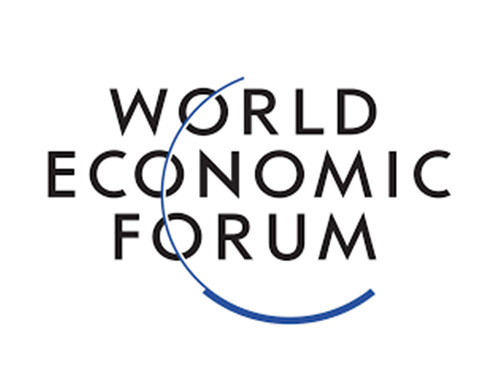 HUBO to Present at the 2016 World Economic Forum
KAIST researchers will lead an IdeasLab on biotechnology for an aging society while HUBO, the winner of the 2015 DARPA Robotics Challenge, will interact with the forum participants, offering an experience of state-of-the-art robotics technology.
Representatives from KAIST will attend the 2016 Annual Meeting of the World Economic Forum to run an IdeasLab and showcase its humanoid robot.
With over 2,500 leaders from business, government, international organizations, civil society, academia, media, and the arts expected to participate, the 2016 Annual Meeting will take place on January 20-23, 2016 in Davos-Klosters, Switzerland. Under the theme of “Mastering the Fourth Industrial Revolution,” global leaders will discuss the period of digital transformation that will have profound effects on economies, societies, and human behavior.
President Sung-Mo Kang will join the Global University Leaders Forum (GULF), a high-level academic meeting to foster collaboration among experts on issues of global concern for the future of higher education and the role of science in society. He will discuss how the emerging revolution in technology will affect the way universities operate and serve society. KAIST is the only Korean university participating in GULF, which is composed of prestigious universities invited from around the world.
Four KAIST professors, including Distinguished Professor Sang Yup Lee of the Chemical and Biomolecular Engineering Department, will lead an IdeasLab on “Biotechnology for an Aging Society.”
Professor Lee said, “In recent decades, much attention has been paid to the potential effect of the growth of an aging population and problems posed by it. At our IdeasLab, we will introduce some of our research breakthroughs in biotechnology to address the challenges of an aging society.”
In particular, he will present his latest research in systems biotechnology and metabolic engineering. His research has explained the mechanisms of how traditional Oriental medicine works in our bodies by identifying structural similarities between effective compounds in traditional medicine and human metabolites, and has proposed more effective treatments by employing such compounds.
KAIST will also display its networked mobile medical service system, “Dr. M.” Built upon a ubiquitous and mobile Internet, such as the Internet of Things, wearable electronics, and smart homes and vehicles, Dr. M will provide patients with a more affordable and accessible healthcare service.
In addition, Professor Jun-Ho Oh of the Mechanical Engineering Department will showcase his humanoid robot, “HUBO,” during the Annual Meeting. His research team won the International Humanoid Robotics Challenge hosted by the United States Defense Advanced Research Projects Agency (DARPA), which was held in Pomona, California, on June 5-6, 2015. With 24 international teams participating in the finals, HUBO completed all eight tasks in 44 minutes and 28 seconds, 6 minutes earlier than the runner-up, and almost 11 minutes earlier than the third-place team. Team KAIST walked away with the grand prize of USD 2 million.
Professor Oh said, “Robotics technology will grow exponentially in this century, becoming a real driving force to expedite the Fourth Industrial Revolution. I hope HUBO will offer an opportunity to learn about the current advances in robotics technology.”
President Kang pointed out, “KAIST has participated in the Annual Meeting of the World Economic Forum since 2011 and has engaged with a broad spectrum of global leaders through numerous presentations and demonstrations of our excellence in education and research. Next year, we will choreograph our first robotics exhibition on HUBO and present high-tech research results in biotechnology, which, I believe, epitomizes how science and technology breakthroughs in the Fourth Industrial Revolution will shape our future in an unprecedented way.”
2015.11.18 View 14281
HUBO to Present at the 2016 World Economic Forum
KAIST researchers will lead an IdeasLab on biotechnology for an aging society while HUBO, the winner of the 2015 DARPA Robotics Challenge, will interact with the forum participants, offering an experience of state-of-the-art robotics technology.
Representatives from KAIST will attend the 2016 Annual Meeting of the World Economic Forum to run an IdeasLab and showcase its humanoid robot.
With over 2,500 leaders from business, government, international organizations, civil society, academia, media, and the arts expected to participate, the 2016 Annual Meeting will take place on January 20-23, 2016 in Davos-Klosters, Switzerland. Under the theme of “Mastering the Fourth Industrial Revolution,” global leaders will discuss the period of digital transformation that will have profound effects on economies, societies, and human behavior.
President Sung-Mo Kang will join the Global University Leaders Forum (GULF), a high-level academic meeting to foster collaboration among experts on issues of global concern for the future of higher education and the role of science in society. He will discuss how the emerging revolution in technology will affect the way universities operate and serve society. KAIST is the only Korean university participating in GULF, which is composed of prestigious universities invited from around the world.
Four KAIST professors, including Distinguished Professor Sang Yup Lee of the Chemical and Biomolecular Engineering Department, will lead an IdeasLab on “Biotechnology for an Aging Society.”
Professor Lee said, “In recent decades, much attention has been paid to the potential effect of the growth of an aging population and problems posed by it. At our IdeasLab, we will introduce some of our research breakthroughs in biotechnology to address the challenges of an aging society.”
In particular, he will present his latest research in systems biotechnology and metabolic engineering. His research has explained the mechanisms of how traditional Oriental medicine works in our bodies by identifying structural similarities between effective compounds in traditional medicine and human metabolites, and has proposed more effective treatments by employing such compounds.
KAIST will also display its networked mobile medical service system, “Dr. M.” Built upon a ubiquitous and mobile Internet, such as the Internet of Things, wearable electronics, and smart homes and vehicles, Dr. M will provide patients with a more affordable and accessible healthcare service.
In addition, Professor Jun-Ho Oh of the Mechanical Engineering Department will showcase his humanoid robot, “HUBO,” during the Annual Meeting. His research team won the International Humanoid Robotics Challenge hosted by the United States Defense Advanced Research Projects Agency (DARPA), which was held in Pomona, California, on June 5-6, 2015. With 24 international teams participating in the finals, HUBO completed all eight tasks in 44 minutes and 28 seconds, 6 minutes earlier than the runner-up, and almost 11 minutes earlier than the third-place team. Team KAIST walked away with the grand prize of USD 2 million.
Professor Oh said, “Robotics technology will grow exponentially in this century, becoming a real driving force to expedite the Fourth Industrial Revolution. I hope HUBO will offer an opportunity to learn about the current advances in robotics technology.”
President Kang pointed out, “KAIST has participated in the Annual Meeting of the World Economic Forum since 2011 and has engaged with a broad spectrum of global leaders through numerous presentations and demonstrations of our excellence in education and research. Next year, we will choreograph our first robotics exhibition on HUBO and present high-tech research results in biotechnology, which, I believe, epitomizes how science and technology breakthroughs in the Fourth Industrial Revolution will shape our future in an unprecedented way.”
2015.11.18 View 14281 -
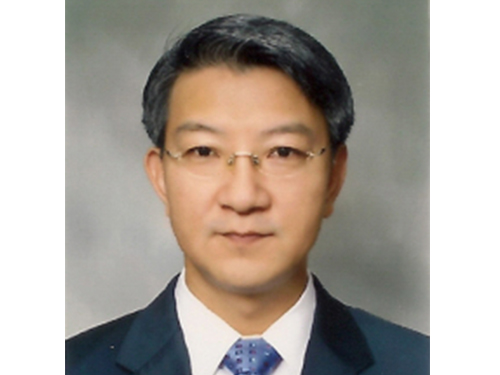 Distinguished Professor Sang Yup Lee Attends World Economic Forum's Workshop
Sang Yup Lee, Distinguished Professor of Chemical and Biomolecular Engineering at KAIST was invited to attend the Technology Pioneer and Global Growth Company CEO Workshop hosted by the World Economic Forum (WEF) on June 19-20, 2014 in San Francisco. During the workshop, Professor Lee joined a discussion on “disruptive technologies” as a panelist.
Currently serving for the evaluation committee that selects technology pioneers for the workshop, during the discussion, Professor Lee identified important issues facing humanity, analyzed the issues through forecasting, and presented converging disruptive technologies that provide solutions to the problems. He also shared the “ten emerging technologies” announced by the Global Agenda Council on Emerging Technologies, WEF and the Korean government’s technology innovation strategies adopted to achieve its economic development policy called creative economy.
2014.06.22 View 10248
Distinguished Professor Sang Yup Lee Attends World Economic Forum's Workshop
Sang Yup Lee, Distinguished Professor of Chemical and Biomolecular Engineering at KAIST was invited to attend the Technology Pioneer and Global Growth Company CEO Workshop hosted by the World Economic Forum (WEF) on June 19-20, 2014 in San Francisco. During the workshop, Professor Lee joined a discussion on “disruptive technologies” as a panelist.
Currently serving for the evaluation committee that selects technology pioneers for the workshop, during the discussion, Professor Lee identified important issues facing humanity, analyzed the issues through forecasting, and presented converging disruptive technologies that provide solutions to the problems. He also shared the “ten emerging technologies” announced by the Global Agenda Council on Emerging Technologies, WEF and the Korean government’s technology innovation strategies adopted to achieve its economic development policy called creative economy.
2014.06.22 View 10248 -
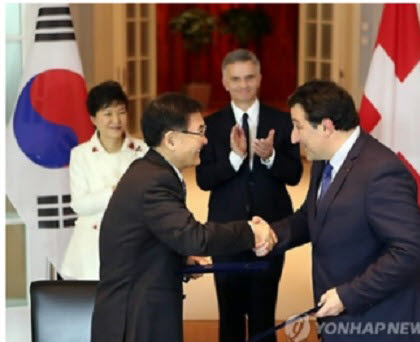 2014 Davos Forum: KAIST-EPFL Connection
The Korean-American Science and Technology News (KASTN), a biweekly global electronic newsletter carrying news and analyses in science and technology, as well as social, economic, and cultural issues related to the general interest of the Korean-American professional community, published an article on the partnership agreement made by KAIST and the Ecole Polytechnique Federale Lausanne (EPFL) during the 2014 World Economic Forum held at Davos, Switzerland, from January 22nd to 25th.
For the article, please click the link below: KASTN Issue 14-05, February 26, 2014
http://www.phy.duke.edu/~myhan/b_14-05.pdf
2014.02.04 View 10351
2014 Davos Forum: KAIST-EPFL Connection
The Korean-American Science and Technology News (KASTN), a biweekly global electronic newsletter carrying news and analyses in science and technology, as well as social, economic, and cultural issues related to the general interest of the Korean-American professional community, published an article on the partnership agreement made by KAIST and the Ecole Polytechnique Federale Lausanne (EPFL) during the 2014 World Economic Forum held at Davos, Switzerland, from January 22nd to 25th.
For the article, please click the link below: KASTN Issue 14-05, February 26, 2014
http://www.phy.duke.edu/~myhan/b_14-05.pdf
2014.02.04 View 10351 -
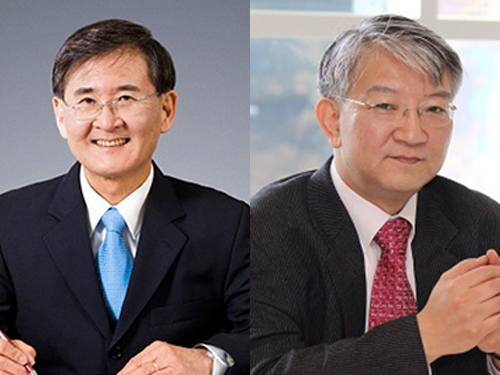 KAIST Participates in the 2014 Davos Forum on January 22-25 in Switzerland
Through the sessions of the Global University Leaders Forum, IdeasLab, and Global Agenda Councils on Biotechnology, KAIST participants will actively engage with global leaders in the discussion of issues on education innovation and technological breakthroughs.
The 2014 Annual Meeting of the World Economic Forum (WEF), known as the Davos Forum, will kick off on January 22-25 in Davos-Klosters, Switzerland, under the theme of "The Reshaping of the World: Consequences for Society, Politics, and Business." Each year, the Forum attracts about 2,500 distinguished leaders from all around the world and provides an open platform to identify the current and emerging challenges facing the global community and to develop ideas and actions necessary to respond to such challenges.
President Sung-Mo Steve Kang and Distinguished Professor Sang Yup Lee from the Department of Chemical and Biomolecular Engineering, KAIST, will attend the Forum and engage in a series of dialogues on such issues as Massive Open Online Courses, new paradigms for universities and researchers, the transformation of higher education, the role and value of scientific discoveries, and the impact of biotechnology on the future of society and business.
At the session entitled "New Paradigms for Universities of the Future" hosted by the Global University Leaders Forum (GULF), President Kang will introduce KAIST"s ongoing online education program, Education 3.0. GULF was created in 2006 by WEF, which is a small community of the presidents and senior representatives of the top universities in the world.
Implemented in 2012, Education 3.0 incorporates advanced information and communications technology (ICT) to offer students and teachers a learner-based, team-oriented learning and teaching environment. Under Education 3.0, students study online and meet in groups with a professor for in-depth discussions, collaboration, and problem-solving. KAIST plans to expand the program to embrace the global community in earnest by establishing Education 3.0 Global in order to have interactive real-time classes for students and researchers across regions and cultures.
President Kang will also present a paper entitled "Toward Socially Responsible Technology: KAIST"s Approach to Integrating Social and Behavioral Perspectives into Technology Development" at another session of GULF called "Seeking New Approaches to Critical Global Challenges." In the paper, President Kang points out that notwithstanding the many benefits we enjoy from the increasingly interconnected world, digital media may pose a threat to become a new outlet for social problems, for example, Internet or digital addiction.
Experts say that early exposure to digital devices harms the healthy development of cognitive functions, emotions, and social behavior. President Kang will introduce KAIST"s recent endeavor to develop a non-intrusive technology to help prevent digital addiction, which will ultimately be embedded in the form of a virtual coach or mentor that helps and guides people under risk to make constructive use of digital devices. President Kang stresses the fundamental shift in the science and technology development paradigm from research and development (R&D) to a research and solution development (R&SD), taking serious consideration of societal needs, quality of life, and social impacts when conducting research.
Professor Sang Yup Lee will moderate the IdeasLab session at the Davos Forum entitled "From Lab to Life with the California Institute of Technology (Caltech)." Together with scientists from Caltech, he will discuss scientific breakthroughs that transform institutions, industries, and individuals in the near future, such as the development of damage-tolerant lightweight materials with nanotechnology, the ability to read and write genomes, and wireless lab-in-the-body monitors. In addition, he will meet global business leaders at the session of "Sustainability, Innovation, and Growth" and speak about how emerging technologies, biotechnology in particular, will transform future societies, business, and industries.
As a current special adviser of the World Economic Forum"s (WEF) Chemicals Industry Community, Professor Lee will meet global chairs and chief executive officers of chemical companies and discuss ways to advance the industry to become more bio-based and environmentally friendly. He served as a founding chairman of WEF"s Global Agenda Councils on Biotechnology in 2013.
President Sung-Mo Steve Kang Distinguished Professor Sang Yup Lee
2014.01.17 View 12611
KAIST Participates in the 2014 Davos Forum on January 22-25 in Switzerland
Through the sessions of the Global University Leaders Forum, IdeasLab, and Global Agenda Councils on Biotechnology, KAIST participants will actively engage with global leaders in the discussion of issues on education innovation and technological breakthroughs.
The 2014 Annual Meeting of the World Economic Forum (WEF), known as the Davos Forum, will kick off on January 22-25 in Davos-Klosters, Switzerland, under the theme of "The Reshaping of the World: Consequences for Society, Politics, and Business." Each year, the Forum attracts about 2,500 distinguished leaders from all around the world and provides an open platform to identify the current and emerging challenges facing the global community and to develop ideas and actions necessary to respond to such challenges.
President Sung-Mo Steve Kang and Distinguished Professor Sang Yup Lee from the Department of Chemical and Biomolecular Engineering, KAIST, will attend the Forum and engage in a series of dialogues on such issues as Massive Open Online Courses, new paradigms for universities and researchers, the transformation of higher education, the role and value of scientific discoveries, and the impact of biotechnology on the future of society and business.
At the session entitled "New Paradigms for Universities of the Future" hosted by the Global University Leaders Forum (GULF), President Kang will introduce KAIST"s ongoing online education program, Education 3.0. GULF was created in 2006 by WEF, which is a small community of the presidents and senior representatives of the top universities in the world.
Implemented in 2012, Education 3.0 incorporates advanced information and communications technology (ICT) to offer students and teachers a learner-based, team-oriented learning and teaching environment. Under Education 3.0, students study online and meet in groups with a professor for in-depth discussions, collaboration, and problem-solving. KAIST plans to expand the program to embrace the global community in earnest by establishing Education 3.0 Global in order to have interactive real-time classes for students and researchers across regions and cultures.
President Kang will also present a paper entitled "Toward Socially Responsible Technology: KAIST"s Approach to Integrating Social and Behavioral Perspectives into Technology Development" at another session of GULF called "Seeking New Approaches to Critical Global Challenges." In the paper, President Kang points out that notwithstanding the many benefits we enjoy from the increasingly interconnected world, digital media may pose a threat to become a new outlet for social problems, for example, Internet or digital addiction.
Experts say that early exposure to digital devices harms the healthy development of cognitive functions, emotions, and social behavior. President Kang will introduce KAIST"s recent endeavor to develop a non-intrusive technology to help prevent digital addiction, which will ultimately be embedded in the form of a virtual coach or mentor that helps and guides people under risk to make constructive use of digital devices. President Kang stresses the fundamental shift in the science and technology development paradigm from research and development (R&D) to a research and solution development (R&SD), taking serious consideration of societal needs, quality of life, and social impacts when conducting research.
Professor Sang Yup Lee will moderate the IdeasLab session at the Davos Forum entitled "From Lab to Life with the California Institute of Technology (Caltech)." Together with scientists from Caltech, he will discuss scientific breakthroughs that transform institutions, industries, and individuals in the near future, such as the development of damage-tolerant lightweight materials with nanotechnology, the ability to read and write genomes, and wireless lab-in-the-body monitors. In addition, he will meet global business leaders at the session of "Sustainability, Innovation, and Growth" and speak about how emerging technologies, biotechnology in particular, will transform future societies, business, and industries.
As a current special adviser of the World Economic Forum"s (WEF) Chemicals Industry Community, Professor Lee will meet global chairs and chief executive officers of chemical companies and discuss ways to advance the industry to become more bio-based and environmentally friendly. He served as a founding chairman of WEF"s Global Agenda Councils on Biotechnology in 2013.
President Sung-Mo Steve Kang Distinguished Professor Sang Yup Lee
2014.01.17 View 12611